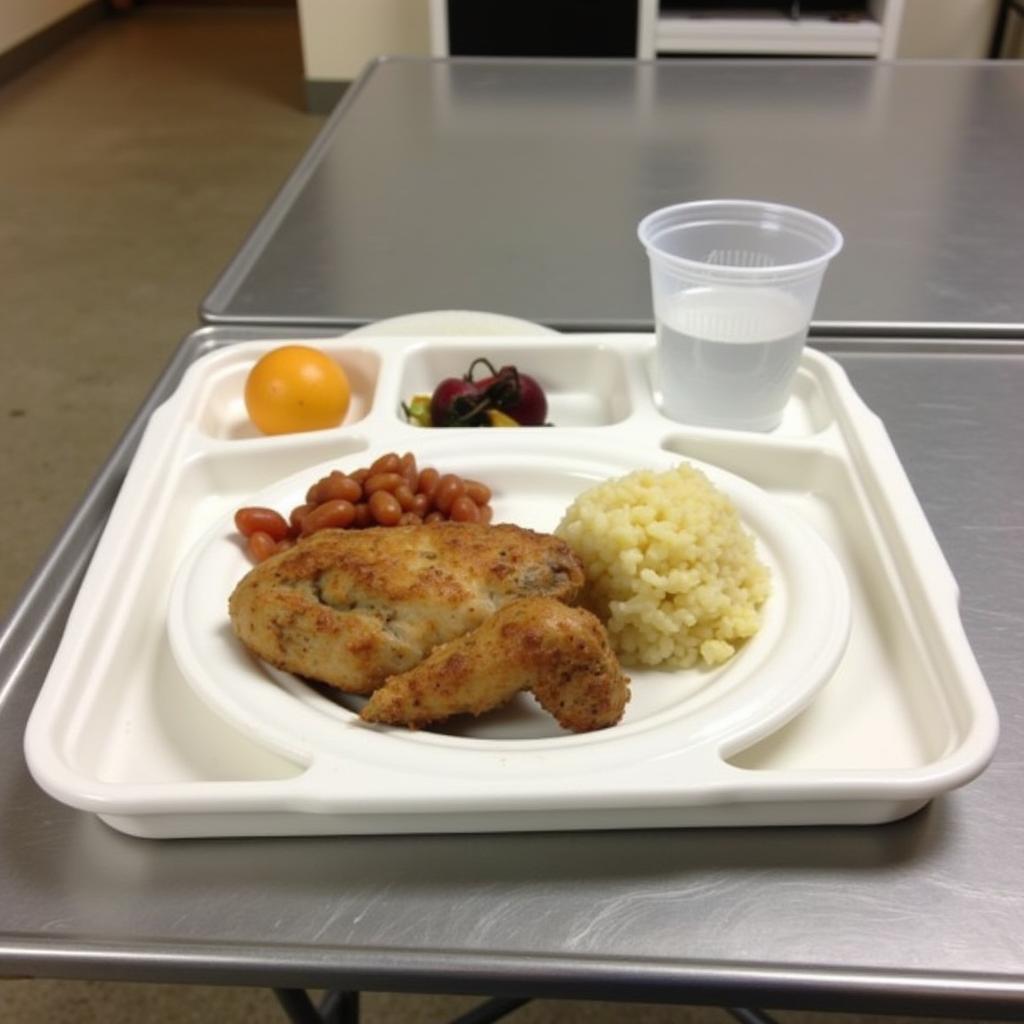Florida Jail Food. It’s a topic shrouded in mystery, often conjured up in movies and TV shows as bland, unappetizing, and barely edible. But what’s the real story behind those bars? This article delves into the truth about Florida jail food, exploring the nutritional guidelines, the challenges faced by correctional facilities, and the impact of mealtime on inmates’ well-being.
What’s on the Menu? A Look at Typical Florida Jail Food
 Typical Florida Jail Food Tray
Typical Florida Jail Food Tray
Contrary to popular belief, Florida jail food isn’t solely about mystery meat and stale bread. While budgetary constraints and logistical challenges certainly play a role, there are nutritional guidelines in place to ensure inmates receive a balanced diet. This typically includes a combination of protein, carbohydrates, vegetables, and fruits. Think along the lines of simple dishes like chicken and rice, beans and cornbread, or pasta with a side salad.
Nutritional Guidelines and Considerations
The Florida Department of Corrections has established specific dietary guidelines for inmates, aiming to meet their basic nutritional needs. These guidelines take into account factors such as age, activity level, and any existing medical conditions. Special diets are often available for inmates with allergies or religious restrictions. However, the reality is that variety and flavor are often limited due to cost-cutting measures.
The Challenges of Providing Food in Correctional Facilities
Feeding a large population within the confines of a correctional facility presents unique challenges. Security concerns, limited budgets, and the sheer volume of meals required daily contribute to a system that often prioritizes efficiency over culinary excellence. Food preparation is usually handled by inmates under the supervision of trained staff. This helps reduce costs and provides inmates with valuable job skills.
Budgeting and Logistics in Florida Jails
Florida jail budgets are constantly under scrutiny, and food service is no exception. Providing nutritious meals while staying within budget requires careful planning and resource management. This often means relying on inexpensive, shelf-stable ingredients and simplifying recipes. The procurement and storage of food also present logistical hurdles.
The Impact of Food on Inmate Well-being
Mealtime in jail is more than just about sustenance. It’s a structured part of the day, providing a sense of normalcy in an otherwise restrictive environment. Food can also play a role in inmate behavior. Adequate nutrition can contribute to better mood and reduced aggression, while dissatisfaction with food quality can lead to tension and unrest.
Beyond the Plate: Food as a Tool for Rehabilitation
Some Florida correctional facilities are exploring the use of food programs as a tool for rehabilitation. Culinary training programs offer inmates the opportunity to learn valuable job skills that can help them reintegrate into society upon release. These programs can also foster a sense of accomplishment and purpose. If you are looking for information on food handler permits, consider checking out our resources on food and alcohol certification florida.
Conclusion: Understanding the Complexities of Florida Jail Food
Florida jail food is a complex issue with various factors at play. While it’s far from gourmet dining, the goal is to provide adequate nutrition within the constraints of a correctional setting. Understanding these complexities helps us appreciate the challenges faced by both inmates and correctional staff. Florida jail food continues to evolve as correctional facilities strive to improve their food service programs and prioritize inmate well-being.
FAQ
- What kind of food do inmates in Florida jails eat? Inmates typically receive meals that meet basic nutritional guidelines, including protein, carbohydrates, vegetables, and fruits.
- Who prepares the food in Florida jails? Food is usually prepared by inmates under the supervision of trained staff.
- Are there special diets available for inmates with dietary restrictions? Yes, special diets are often accommodated for allergies, religious reasons, and medical conditions.
- What are the challenges of providing food in correctional facilities? Challenges include security concerns, limited budgets, and the logistics of feeding a large population.
- How does food impact inmate well-being? Mealtime provides structure and normalcy, while adequate nutrition can contribute to better behavior.
- Are there food-related rehabilitation programs in Florida jails? Some facilities offer culinary training programs to help inmates develop job skills.
- What is the future of Florida jail food? Correctional facilities are continuously working to improve food service programs and prioritize inmate well-being.
Common Scenarios and Questions about Florida Jail Food
- Scenario: A family member is concerned about the quality of food their loved one is receiving in jail. Question: How can I find out more about the specific menu and nutritional information at a particular Florida jail?
- Scenario: An inmate has a specific dietary need. Question: What is the process for requesting a special diet in a Florida jail?
Further Resources
For more information on food safety and regulations, visit our page on food and alcohol certification florida.
Need Help?
For further assistance, please contact us at Phone Number: 02437655121, Email: minacones@gmail.com, or visit our office at 3PGH+8R9, ĐT70A, thôn Trung, Bắc Từ Liêm, Hà Nội, Việt Nam. Our customer service team is available 24/7.